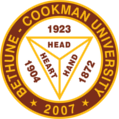Responding to the Call: Combating Institutionalized Racism within the Criminal Justice System
OPINION: Bethune-Cookman University Criminal Justice Program & Center for Law & Social Justice and University of South Florida Department of Criminology
The long history of racial biases and tensions that have become part of the social fabric and organization of American society has periodically been brought into high relief by seemingly unconnected incidents involving police violence against Black peoples. Each of these extremely unfortunate individual incidents forms part of a larger pattern of institutionalized racism in the U.S. Before proceeding, it is important to note that police violence, and inequality in arrests, conviction and sentencing along racial and ethnic lines are only a few of the adverse outcomes associated with broader evidence of structural and institutionalized racism in American institutions. Thus, addressing the adverse racial biases and disparities seen in the criminal justice process requires more than limited policies specific to one manifestation of institutionalized racial bias in any given sphere of the criminal justice system.
In the recent context of the tragic killing of George Floyd, different groups and individuals have pledged their support to help end these injustices. Those pledges mean little without action. Toward this end, our two departments -- from different universities on opposite coasts of Florida (Bethune-Cookman University {B-CU} and the University of South Florida {USF}) -- have previously come together to respond to the under-representation of African Americans in the field of criminology and criminal justice. It should be noted that while the proportion of Blacks under the supervision of the criminal justice system is very high, their representation among those managing that system, and among researchers and University faculty is shamefully low.
Here, we take this opportunity to briefly describe what we have been doing to support greater access to our graduate programs in criminology and criminal justice to improve African American representation in those disciplines. We encourage others to take similar steps. To be sure, USF’s graduate program is not ideal, and suffers from some issues we hope to address, such as the under-representation of people of color, the failure to require courses addressing racial diversity/inclusion in criminal justice, and a failure to address concerns among local communities of color in the Tampa area. That said, we believe the co-sponsored B-CU/USF program represents the kind of active engagement universities can adopt to address some of the structural barriers to success African Americans face within academia, which may also help to dismantle the legacy of institutionalized racism in America.
The conceptualization of this program began a decade ago, when Bethune-Cookman and its Director of the Criminal Justice Graduate Program, Randy B. Nelson invited the University of South Florida through Professor Mike Lynch to create an enhanced access entry program for African American students into USF’s Criminology graduate program. Dr. Lynch served as Dr. Nelson’s mentor and major professor during his matriculation through the Florida State University Criminology doctoral program in 1997. B-CU committed to pay a stipend for one of its African American criminal justice graduates to attend USF’s Criminology graduate program. In exchange, USF provided a tuition waiver and other expenses, as well as a scholarship to complete the final year of the Ph.D. program. USF also established a dedicated mentoring program for the selected student. As part of this agreement, the student will be required to return to B-CU upon graduation to serve as a faculty member there for a period of two years.
In envisioning this project, we endeavored to construct a program consistent with the vision and values of Dr. Mary McLeod Bethune, who founded Bethune-Cookman University in 1904. Dr. Bethune, who for many years fought for social justice in various forms, is recognize as being the only African American woman to serve on the U.S. delegation that drafted the United Nations charter. She later served as cofounder of the United Negro College Fund.
To date, the first student in that program has completed a M.A. degree, and is entering the third year of the Ph.D. program. In the meantime, a second B-CU student has also joined the program. While it is too early to speak of the successes of the students or the program, our departments hope that our initial project and experiences can be used to attract outside donor support for this initiative to further enhance access to doctoral education in criminology and criminal justice for African Americans. We believe that the institutionalization of similar programs throughout the U.S. in departments of criminology/criminal justice can help change the nature of these fields, which, after all, deal extensively with questions of race-linked disparities in criminal justice processes, and issues of fair treatment in the criminal justice system and law.
We believe similar programs and partnerships provide an opportunity to increase the percentage of Blacks receiving terminal degrees within criminology and criminal justice. While we recognize that such an outcome in itself does not undo the historical legacy of racial bias in the United States, we believe it will establish an environment that allows for additional scrutiny of racial biases in the criminal justice system from new generations of scholars who bring fresh perspectives and energy to address one of the most compelling social issues of our time.
Bethune-Cookman University, Department of Justice & Political Studies
University of South Florida, Department of Criminology
